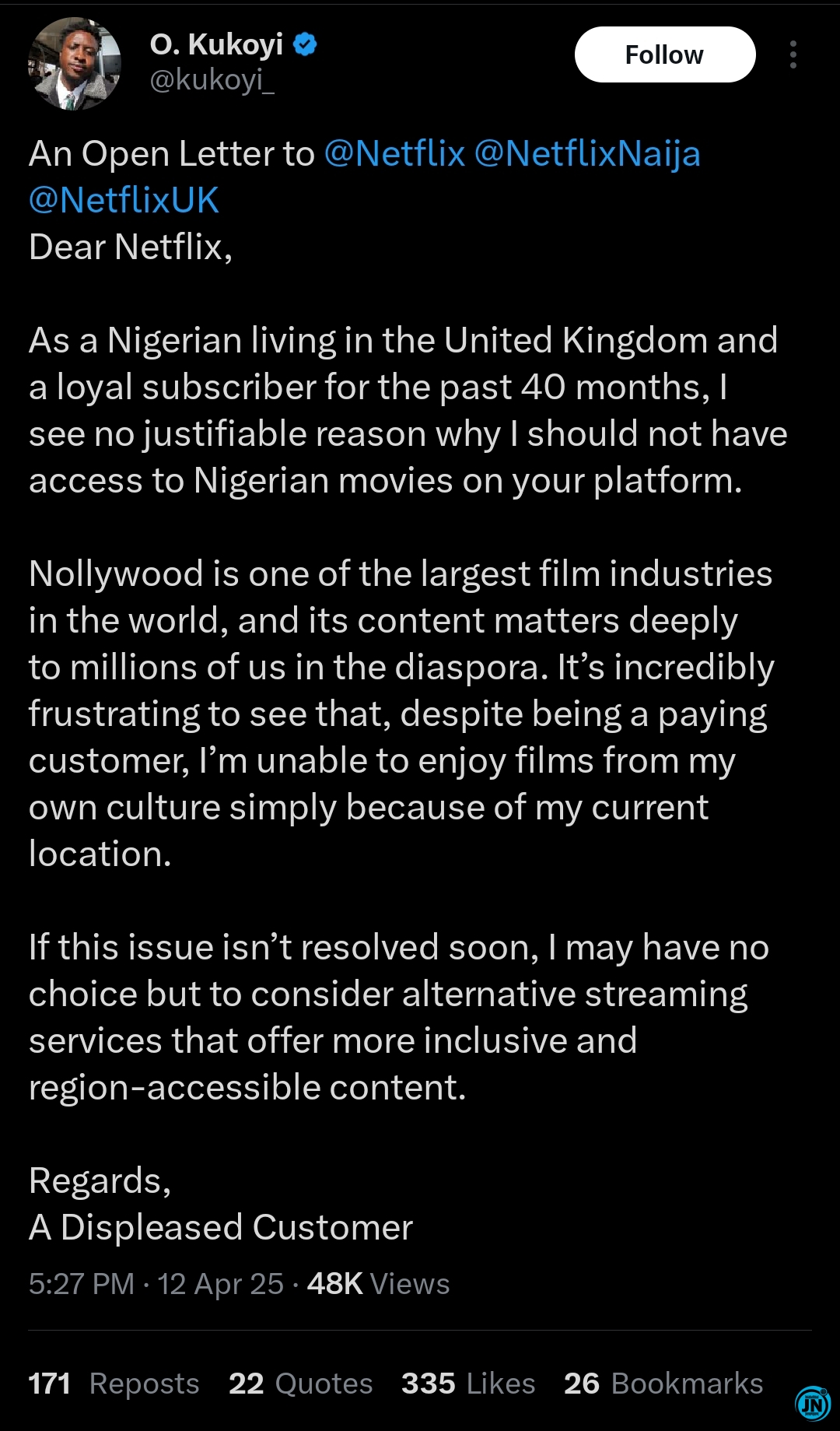A UK-based Nigerian has publicly voiced his displeasure and disappointment towards Netflix, calling out the streaming giant for its failure to make Nigerian movies available to subscribers in the United Kingdom and other parts of the diaspora.
The aggrieved subscriber took to his X (formerly Twitter) handle to pen an open letter directly addressing @Netflix, @NetflixNaija, and @NetflixUK, where he expressed his frustration as a loyal paying customer who has been unable to access Nollywood content on the platform despite holding an active subscription for over three years.

In his candid message, the subscriber questioned the logic behind restricting Nigerian movies and culturally significant content from diaspora audiences while other international films remained readily available across regions.
In his words:
“An Open Letter to @Netflix @NetflixNaija @NetflixUK”
“Dear Netflix,”
“As a Nigerian living in the United Kingdom and a loyal subscriber for the past 40 months, I see no justifiable reason why I should not have access to Nigerian movies on your platform.”
“Nollywood is one of the largest film industries in the world, and its content matters deeply to millions of us in the diaspora.”
“It’s incredibly frustrating to see that, despite being a paying customer, I’m unable to enjoy films from my own culture simply because of my current location.”
“If this issue isn’t resolved soon, I may have no choice but to consider alternative streaming services that offer more inclusive and region-accessible content.”
“Regards,”
“A Displeased Customer”
He further emphasized the importance of Nollywood movies in preserving the identity, culture, and entertainment preferences of Nigerians living abroad, especially in a digital age where access to native content helps people stay connected to their roots.
Following his post, social media users quickly picked up the conversation, with many supporting his concerns while others offered explanations or potential solutions for the issue.
See some reactions below:
@Lincolnshh: “I consider this a form of racism. We can see other country’s content but our content is limited to our region.”
@Olagamaliel: “I feel you bro, but this Geo-restriction issue is more complex than an open letter. It is guided by licensing agreements between the filmmakers and Netflix, regional strategies and quality standards. The filmmakers know the truth but they feign ignorance to their viewers.”
@streekingstreet: “It is more about finance. Nigerians don’t see every region’s work too. It is from the cost, taxes, and restrictions of government on certain content. Some Nigerian content may be offensive to the British audience and vice versa. But they should try to make more contents available.”
@_Thisisvictor: “I might be wrong tho. Don’t quote me! Netflix may choose not to release a film in certain regions based on viewer data. If their analytics show low demand in a region, they might skip licensing the content there to cut costs.”
@shotbygoodjohn: “Get a VPN on your device and switch to any location you wish and you’ll see all the movies and TV shows tailored to that location. BTW, you may be completely disappointed on Nollywood movies on that platform, especially after seeing movies from other countries. You’re welcome.”
@sexykingsolomon: “I guess it’s just geographical zoning… If you’ve got a VPN, you can try Netflix USA and you will find different movies to watch compared to what’s displayed on Netflix UK.”
@tolutea2002: “It’s likely a license issue. You can pay a very little extra for a VPN and enjoy content from Nigeria.”
The conversation around regional content restrictions and lack of inclusivity on global streaming platforms has remained an ongoing debate among Africans in the diaspora, with calls for platforms like Netflix to make African content, especially Nollywood films, more accessible across regions without the need for VPNs or extra costs.
SEE POST:


